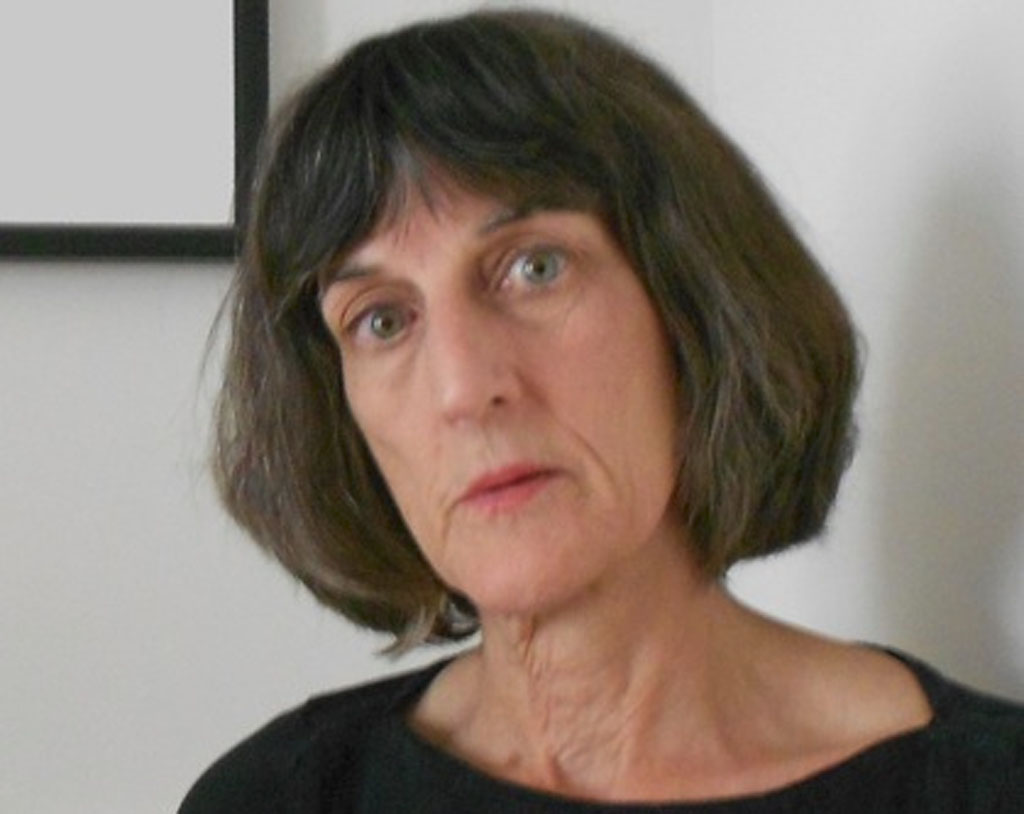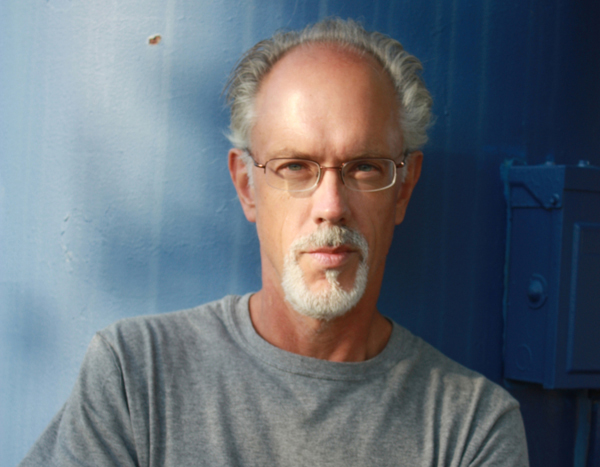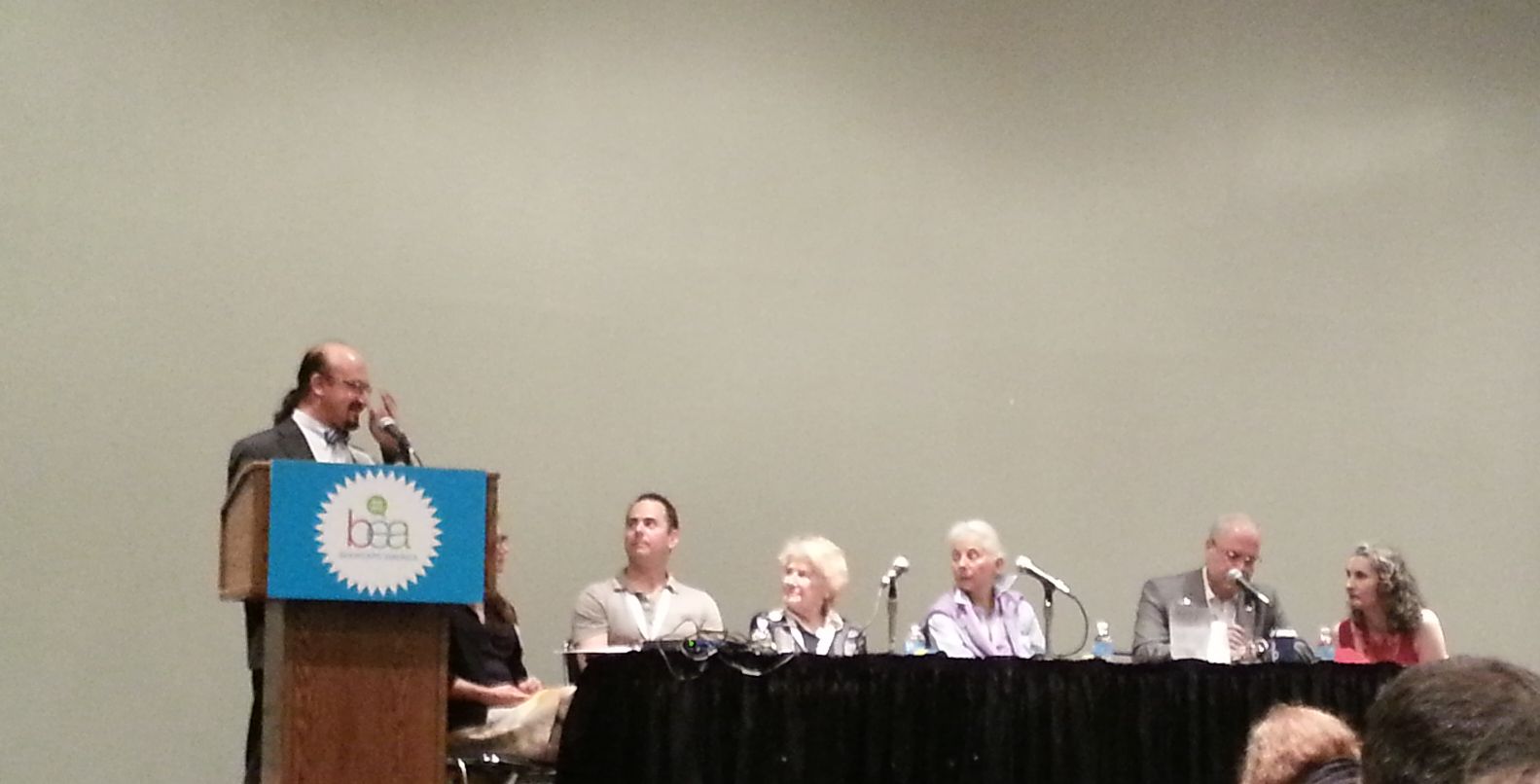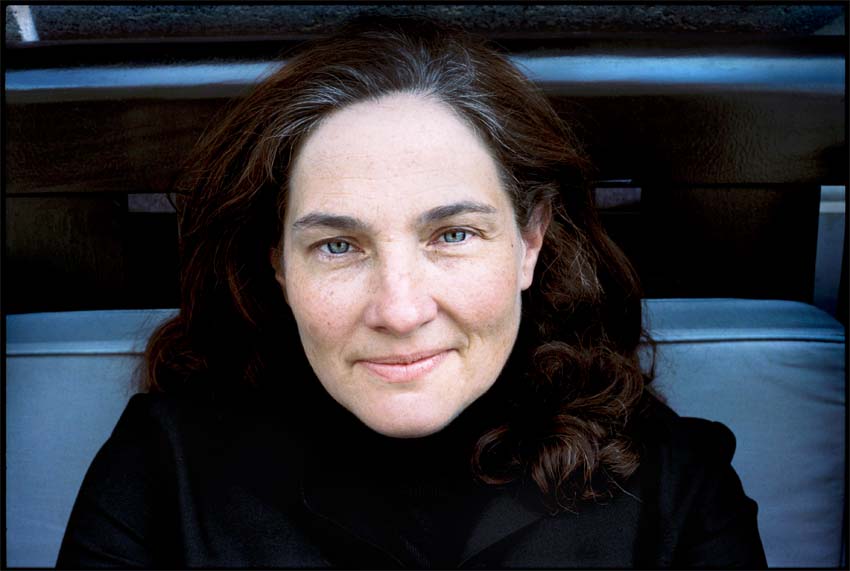Kathryn Davis is most recently the author of Duplex.
Author: Kathryn Davis
Listen: Play in new window | Download
[PROGRAM NOTE: During this program, there is a moment in which Kathryn Davis and Our Correspondent blank out on the name of a religious studies professor who has been studying the intersection of robots and spirituality. That professor’s name is Noreen Herzfeld. And her book, Technology and Religion, examines how technology alters our approach to religion and spirituality. Our apologies to Professor Herzfeld!]
Subjects Discussed: Dogs and babies who occupy Central Park, Leibniz’s idea of the multiverse, the idea of gods forcing followers to believe in a false world, Thomas Wolfe’s Look Homeward Angel, casual reading of quantum mechanics, how drawing from one’s own reality creates phantasmagorical realities, the influence of Alice in Wonderland, being declared the offspring of Virginia Woolf and Lewis Carroll by Joy Press, To the Lighthouse, Orlando, fluidity of consciousness, when unfinished novels have greater moral standing and gravitas than finished novels, the human need for resolution, Davis’s love for murder mysteries, the 1967 Dudley Moore/Peter Cook film Bedazzled, Drimble Wedge & The Vegetations, the sin attached to destroying endings, the decline of mainstream nihilism, the museum scene in Batman, The Passenger, Eric Schlosser’s Command and Conquer, whether today is less traumatic than decades past, the edge of the world as a real place, when limitless realities involve soul searching, fluidity of time and fluidity of place and the commodification of the soul, questions of the animating spirit, essential essence buried in Duplex, castigating the unadventurous human spirit, when people value states more than having a soul, consumption vs. the spirit, the false notion of “having it all,” word origins of “aquanaut” and “robot,” the aquanaut and robot as spiritual ways of being human, whether the age of a word affect its usage, living in a pre-Snooki Jersey Shore, attempting to pin down how the concept of being out in the open air came to define living, viewing the word “monster” in a positive light, the etymology of “monster” (which has the same Latin root as “monitor”), writing someone off with a word, conquering fears by understanding the history of a word, having sympathy for monsters, when robots are fond of naming things, broadening interest in the Other, applying finite nouns in an infinite universe, how technology can generate its own creation myths, why Davis didn’t always explore the nature of religion in Duplex, developing the “rain of beads” parable, The Thin Place, approaching spirituality from a secular place, the tech crowd’s alignment with atheism, singularity, Noreen Herzfeld’s thoughts on the soul in the machine, Davis’s fondness of dachshunds, literary connections to dachshunds, Gary Shteyngart, Nabokov, babushka dancing, extremely geeky literary dog jokes, horse storytelling, Jane Smiley, writing for Significant Objects and incorporating the material in Duplex, Molly Peck’s remarkable video in response to Our Correspondent’s Significant Objects story, being an unapologetic magpie, how yellow bears helped to inform Davis’s sense of a sorcerer, the violent sexuality within Duplex, intimacy and pilfering space, the appalling horror of growing up, observations from Alizah Salario, how real women aren’t immune to time, gender roles and age, including an entire lifetime in a book, triangular sideburns, Charlie Sheen’s strange haircut in Major League, baseball players and facial hair, trading cards, the Cabbage Patch Dolls vs. the Garbage Pail Kids, negotiating difficult territory, Calvino’s “Body-without-Soul,” the hesitation when opening doors, how language provides a path forward in the novel, when writers force themselves to stay in a place where they are clearly bored, Kate Atkinson, and writing about what you want to know about.
EXCERPT FROM SHOW:
Correspondent: This morning, I was reading this piece at Aeon Magazine by Andrew Crumey about how much of contemporary art is still wrestling with Leibniz’s ideas about the multiverse. Now Leibniz claimed that all possible worlds exist in the mind of God and that he ultimately chooses one universe made consistent by a principle of harmony. And of course, I was reading this and thinking, “Oh! This is absolutely what Kathryn’s doing with her book.” God is usually benevolent, but he wouldn’t make us believe in the reality of a false world, according to Leibniz. But your novel Duplex seems to be resisting this idea to some extent. Because you’re almost asking us to believe in a world that is almost post-reality. So I’m wondering, just to start off here, to what degree did Leibniz and the spirit of the multiverse inform the writing of this book? Just a minor little question like that.
Davis: An easy question. I would say that there was nothing so specific as something I read that informed the universe of the book. But the universe of the book is, in fact, the universe I dwell in. So that in a way, I feel like Duplex is as much a work of realism as Look Homeward Angel.
Correspondent: (laughs)
Davis: I don’t know why that occurred to me.
Correspondent: Especially since he writes very fat books. Thomas Wolfe.
Davis: That’s right. And I didn’t want this to be a thick book.
Correspondent: Are you claiming to be Eugene Gant in any way?
Davis: No. Not a bit. But I do feel like it’s my experience of the world that I was trying to replicate in the book. Now I, at one time, read an enormous amount of cosmology, got very interested in that without being at all trained as a scientist. So I got interested in the way that non-scientists do, taking a more metaphoric…
Correspondent: Quantum mechanics is lay reading basically.
Davis: Yeah. And that is true also of topology, which I’m attracted to without understanding anything about it really. And yet the idea that there are ways to think about the world we live in that stretch the logical mind into a shape that doesn’t resemble anything recognizable — that is very appealing to me.
Correspondent: So what I’m getting here is you’re drawing initially from your particular reality.
Davis: Yes.
Correspondent: Whether it be suburban, whether it be smaller city. And you’re using much of this additional reading to create the kind of fantastic and phantsmagorical experience. I’m wondering, aside from just how it subverts the experience, how language plays into this as well. Because that’s extremely curious. Why do you think you’re reading something along the lines of this gives your novel an edge? I mean, are you always resisting the prosaic or what here?
Davis: Well, I don’t know that I resist the prosaic. In fact, writing this book, I felt that, with my experience growing up on a suburban street in Philadelphia, I really wanted to replicate that, which was a very — in its own way — prosaic experience. And yet it was also clear to me that the prosaic had, if you unfolded it or untucked the edge…
Correspondent: Unboxed it.
Davis: Yes. There would be things much less prosaic going on, as, for example, a family of robots living on the street.
Correspondent: Which is clearly drawn from reality.
Davis: Absolutely!
Correspondent: (laughs)
Davis: I won’t name the family, but there certainly was a family where the oddness of the family, as on any suburban street — I would say anyone. Ask anyone and they will say, “Oh yeah. There could have been a family of robots living on our street.” There could have been a sorcerer who came and messed around with the souls of the young people. That would be another way of describing a family that just didn’t seem like all the other families.
Correspondent: So what you’re basically doing is that you’re trying to, I suppose, avoid the prosaic or chronicle the prosaic by really tapping into all forms of perception.
Davis: Yes.
Correspondent: And, as a result, this is why this particular world in Duplex has no time, no space, has edges that are constantly shifting, has waves that are constantly intruding. To my mind, it seemed like you were challenging the reader to look at something typical. I guess what I’m trying to get at here is that anything typical can become magical simply by just tilting it any kind of direction.
Davis: Yeah. And when I was a kid, the book that my parents read to me, the book that I loved the most and that always seemed like the purest expression of the world I lived in, was Alice in Wonderland. I could not get enough of it. And it really described to me the world I grew up in, the house I grew up in, the people I spent my time with. So in a way, I’m doing nothing different in this book than I feel that Lewis Carroll was doing in Alice.
Correspondent: Well, I know Joy Press once said that you were the offspring of Virginia Woolf and Lewis Carroll.
Davis: Right. I loved that!
Correspondent: Which has cropped up in a couple of interviews I’ve read. But that does bring to mind: would you say that you err more on the side of Carroll than Woolf? Or what?
Davis: Oh, I’d like to think I’m equal parts. I feel like what I learned from reading Virginia Woolf — and again it was the same kind of encounter with a book. In the case of Virginia Woolf, it was To the Lighthouse. And reading it, I couldn’t believe that someone had written that book that just so perfectly talked about the way I experienced the world, which is what you really want, I think, a book to do even if it takes you by surprise. Even if it’s talking about climbing Mount Everest or something, which you’ve never done. But it tells you something that you sort of knew, but in a way that you didn’t know you knew it. So the language of Virginia Woolf and the psychological realm that she so amazingly dwells in and describes: that is every bit as important to me as the perverse antic quality of Carroll’s prose and the world he describes.
Correspondent: So I guess the grounding in consciousness of Virginia Woolf, or even the fluidity of consciousness seen in something like Orlando, which is a favorite of mine…
Davis: I love that book too.
Correspondent: It can also be qualified as science fiction.
Davis: Oh, absolutely.
Correspondent: Why do you think so much of fiction just puts a border there when we’re talking about consciousness? It basically says, “No, you actually have to go ahead and adhere to this idea that life must be crammed into the valise of narrative.” You know what I mean?
Davis: I don’t know. I think it’s a more boring approach to the world of possibility when you’re writing. I certainly know that if I felt like I had to subscribe to a set of rules — if that’s what you had to do in order to be a writer of fiction, I wouldn’t have wanted to be a writer of fiction. I think my sense of not wanting to be a mathematician when I was much younger was because it just seemed like a whole bunch of rules. It turns out I was wrong about that. But the sense that you are being told you can only go this far and no further is of no interest to me.
Correspondent: Yeah. There was an essay in Bookforum — I believe in July. And I can’t remember who wrote it. But it was basically saying that the unfinished novel is of greater moral uplift than the finished novel. Because as you’re writing a novel, this essay said, you’re basically fighting against some kind of mortality. And that mortality is fresh and alive when it’s unfinished. How do you contend with this notion? Because resolutions in your books are not always neat, nor are they actually clear-cut. And I’m wondering. What are your thoughts on this idea of keeping that mortality alive in something that is both unfinished but, as it so happens in your case, is also finished?
Davis: That’s a great question. I’ll say that one of the forms that really appeals to me is the murder mystery.
Correspondent: Yes! I know that.
Davis: And I love everything about a murder mystery actually, except the ending.
Correspondent: Yes. Because you have to have resolution. When I found this out — I was doing research — I was going to ask you about that. Because, I mean, how could you love a form so much? What do you take away from it as a reading experience when you have the cop explain everything or the criminal say, “Here was my plan all along”? I mean, how do you wrestle with such a genre? Which I love, by the way. And actually I do happen to love some of those explanations myself. But what do you take away from it?
Davis: I too — I would hate to read a murder mystery. I would hate to read a P.D. James and not have a resolution. I would want to strangle her. Because the book is set up to give you that. But the form, the generative form, the form where something happens early on or something is said or there’s some sense of a mystery that is established very early on in the book — and part of your pleasure and job as a reader is to track down what’s happening — that feeling is one of my favorite feelings in life. I love not being given a piece of evidence or a clue. I mean, this all goes back, I’m sure, to the house I grew up in. Where nobody said anything outright and you were always trying to figure out what’s going on.
Correspondent: Ah! I see.
Davis: By reading between the lines and reading the clues.
Correspondent: So a constant life of mystery and a constant reading life of mystery.
Davis: Yes! And for my own part, I actually thought, “Well, you love reading these murder mysteries. Why don’t you just write one?” I believe firmly you should write what you love to read. It turns out that if you want to write a murder mystery, you really have to figure out an awful lot of stuff ahead of time in a way that I am just not interested in doing. It would be boring to do that. And I’ve written some books that seem to me, that feel to me to sort of make use of that genre. I felt like that was true of The Walking Tour, for example. But I didn’t want there to be the detective calling everybody into the drawing room and telling everyone what happened.
Correspondent: You must be a big fan of the Antonioni film L’Avventura.
Davis: Oh yeah.
Correspondent: In which the missing girl is never explained. It never actually is explained. I mean, Antonioni to me would seem to be your match for literature. Because there’s so much rich life. And even in his most narrative film, The Passenger, even there you don’t have a clean-cut resolution. You have Jack Nicholson disappear. And you’re still invited to witness this amazing display of life at the end of the picture. I guess the way to continue this conversation is to ask why this is something to be resisted. Why is this a strange underground attitude or set of sensibilities to inhabit in 2013?
Davis: That’s a great question. I mean, I guess…
[A baby cries in the background.]
Correspondent: That was a little critic walking past.
Davis: Sad at the idea of lack of completion.
Correspondent: (laughs)
Davis: I think it makes people very nervous. I think life makes people nervous. And part of what makes people nervous about life is not knowing what lies ahead, even though, if you knew what lay ahead, the idea of actually knowing what’s about to happen is so appalling to me that I don’t even want to think about it. But I also know that the human wish to feel contained and part of a logical system, one that isn’t going to pull the rug out from under you, that’s a very, very strong wish. And it’s probably some kind of a survival mechanism also.
Correspondent: It’s not just a survival mechanism. It makes me think of the joke in the Peter Cook/Dudley Moore movie Bedazzled. There’s one situation where Peter Cook is the Devil. It’s a marvelous movie.
Davis: I love that movie.
Correspondent: The remake is terrible, but this is a genius movie. And there’s one part where Peter Cook picks up mysteries and he’s ripping out the last..
Davis: Ripping out the last page!
Correspondent: Every single one! And the fact that that’s actually condemned as something demonic or something that only the Devil can do, I think says much about our need for resolution, right? (laughs)
Davis: Oh yeah. Well, I felt like the Devil in that movie, in many ways, was doing exactly what you would want…
Correspondent: What you would want to do!
Davis: What you would want to have done! When he scratches the records.
Correspondent: Yes. And, of course, the wonderful song, the terrible pop music song in that, which is hilarious.
Davis: Yes! Scratch that record! Yes, pull out those pages!
Correspondent: But it’s a rebellious act. It’s an act of nihilism. I mean, that’s the thing. Remember — now that we’re thinking cinematic here, it makes me think of Jack Nicholson again as the Joker in Batman, going into the museum and just throwing paint and destroying art. This used to actually be something we contended with in mainstream pictures, mainstream books, mainstream art. And now it’s fascinating to me that with the nihilism, now you have to go to a house like Graywolf in order to actually explore these questions. Why do you think that is?
Davis: Boy, that’s a big question, but I have an answer!
Correspondent: You do!
Davis: Yeah. I think that the timidity, the cultural timidity, has to do with the fact that the world is a frightening place. But is it more frightening now than it was, say, in 1960? No. I don’t think so. In fact, the threat of nuclear annihilation was so present in everybody’s mind.
Correspondent: But maybe it’s out of sight, out of mind. There’s an Eric Schlosser book called Command and Control, which deals with how fragile the entire nuclear infrastructure is.
Davis: But nobody talks about it.
Correspondent: Nobody talks about this. Just as people are accepting the NSA surveillance. People want to accept this kind of thing. Maybe they’re beaten down. Maybe we’re just putting on more blinders these days. Maybe we don’t want to actually open up the floodgates to every single problem. And maybe this is what you say. It’s about living life and accepting it in all of its hard knocks and all that.
Davis: But it is really true. And I’ve thought a lot about this. Because people don’t want you to write books that don’t end happily.
Correspondent: Unlikable characters, which has become a big issue this year.
Davis: Right. Movies. It is now the case where if you go to the movies, especially with the movies made in this country…
Correspondent: You have to go to television to get a gripping narrative.
Davis: And you’re not ever going to see something where there’s going to be an inconclusive or really, really unhappy ending. So I realize the suspense level is eradicated by the fact that, even when somebody’s clinging to the edge of a cliff and you’re thinking, “Oh my God! I hope he’s going to survive,” you know he’s going to. Because they don’t make movies where people drop off cliffs. Because he’s the hero.
Correspondent: So narrative is doomed to go for the default heroic state.
(Loops for this program provided by 40a, cork27, danke, and GamingXSportXClub.)
The Bat Segundo Show #519: Kathryn Davis (Download MP3)




